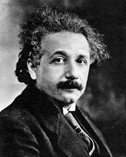

Albert Einstein
Institute for Advanced Study
March 14, 1879 - April 18, 1955
|
Membership Type:
Member
(elected 1942)
Photo Credit: American Institute of Physics, Niels Bohr Library |
Considered by many to be the greatest scientist of the twentieth century, Albert Einstein revolutionized scientific thought with new theories of space, time, mass, motion, and gravitation. Born in Ulm, Germany in 1879, Einstein grew up in Munich. Unable to find a teaching job after graduating from a technical institute in Zurich, Switzerland, he accepted a post as an examiner in the Swiss patent office. He worked there from 1902 to 1909, devoting his spare time to his own scientific interests. In 1905 Einstein received his doctorate in physics from the University of Zurich, and published three scientific papers, each of which had a profound effect on the field of physics. The first paper explained the already-observed photoelectric effect -- by which beams of light cause metals to release electrons which can be converted into electric current -- by suggesting that light be thought of as discrete packets, or quanta, of energy particles. For this work, Einstein in 1921 received the Nobel Prize in Physics. The second paper, on the electrodynamics of moving bodies, put forward Einstein's special theory of relativity and contained the famous equation E = mc2. This equation, which showed that energy and matter are interchangeable, provided the key to the development of atomic energy. The third paper virtually demonstrated the reality of atoms by showing that Brownian motion -- the irregular movement of particles suspended in a liquid or a gas -- is a consequence of molecular motion.
These papers earned Einstein professorships in Bern, Zurich, and Prague. In 1914 he was appointed director of the Kaiser Wilhelm Institute for Physics in Berlin and offered a professorship at the University of Berlin; two years later, in 1916, he published his epochal paper on gravitational fields, "The Foundation of the General Theory of Relativity." When Hitler and the Nazis came to power in Germany in 1933, Einstein emigrated to the United States, where he joined the newly formed Institute for Advanced Study at Princeton. He became a U.S. citizen in 1940 and died here in 1955. In 1942, after having been naturalized, he was elected to full Academy membership and affiliated with the Academy's Physics Section.

